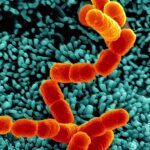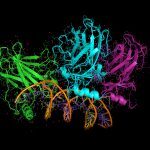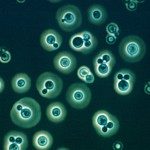Lien vers Pubmed [PMID] – 32817450
Lien DOI – e00476-2010.1128/mSphere.00476-20
mSphere 2020 08; 5(4):
Extracellular vesicles (EVs) are membranous compartments produced by yeast and mycelial forms of several fungal species. One of the difficulties in perceiving the role of EVs during the fungal life, and particularly in cell wall biogenesis, is caused by the presence of a thick cell wall. One alternative to have better access to these vesicles is to use protoplasts. This approach has been investigated here with Aspergillus fumigatus, one of the most common opportunistic fungal pathogens worldwide. Analysis of regenerating protoplasts by scanning electron microscopy and fluorescence microscopy indicated the occurrence of outer membrane projections in association with surface components and the release of particles with properties resembling those of fungal EVs. EVs in culture supernatants were characterized by transmission electron microscopy and nanoparticle tracking analysis. Proteomic and glycome analysis of EVs revealed the presence of a complex array of enzymes related to lipid/sugar metabolism, pathogenic processes, and cell wall biosynthesis. Our data indicate that (i) EV production is a common feature of different morphological stages of this major fungal pathogen and (ii) protoplastic EVs are promising tools for undertaking studies of vesicle functions in fungal cells.IMPORTANCE Fungal cells use extracellular vesicles (EVs) to export biologically active molecules to the extracellular space. In this study, we used protoplasts of Aspergillus fumigatus, a major fungal pathogen, as a model to evaluate the role of EV production in cell wall biogenesis. Our results demonstrated that wall-less A. fumigatus exports plasma membrane-derived EVs containing a complex combination of proteins and glycans. Our report is the first to characterize fungal EVs in the absence of a cell wall. Our results suggest that protoplasts represent a promising model for functional studies of fungal vesicles.







